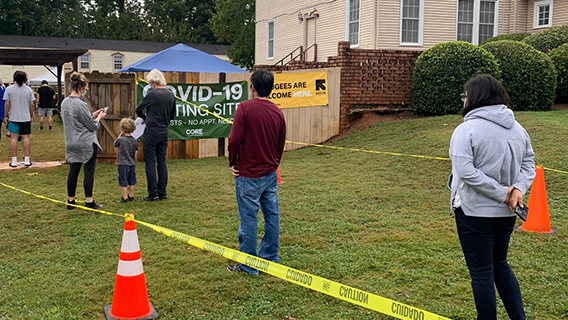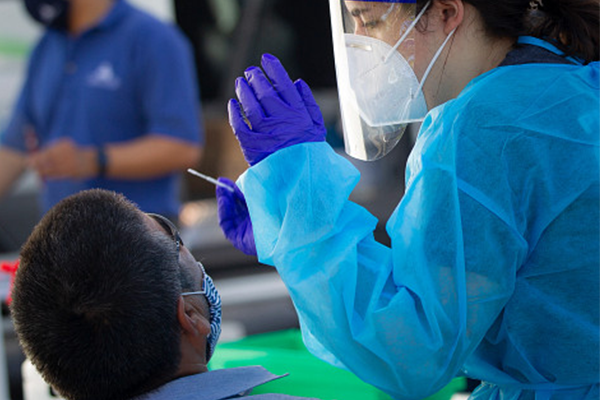Refugee, immigrant, and migrant (RIM) community members face several challenges to accessing COVID-19 testing services due to transportation barriers; difficulty using online registration platforms; and inability to use drive-through testing services if they do not have a car. Furthermore, COVID-19 educational resources may not be translated into RIM languages at traditional COVID-19 testing sites and different elements of the testing process may feel unfamiliar or be challenging to navigate.
Bringing Testing to Communities
Bringing healthcare and testing services to RIM communities has been reported as a promising practice to ensure culturally and linguistically appropriate access to COVID-19 testing services, reduce stigma surrounding testing, and build trust between RIM community members and their local healthcare and medical systems. Some organizations have reported successful outcomes when community testing events are hyper-localized and tailored for a specific community; organized and run by people from the community; located at a frequented community location; and have linguistically and culturally appropriate COVID-19 resources available.
Local NY FQHC Expands COVID-19 Testing Sites to Local Churches and Food Pantry Parking Lots
A federally qualified health center (FQHC) in Buffalo, NY strategically focused on minimizing barriers to COVID-19 testing by expanding community and pop-up testing sites within RIM communities. Community testing was conducted 2-3 times per week, directly outside of the FQHC within church parking lots, and at other community sites. The FQHC worked to eliminate barriers to COVID-19 testing for RIM community members by bringing the testing site directly to the community and not requiring RIM community members to have an ID, insurance, or book an appointment before testing.
IRC Tucson Mobile Testing Sites
The IRC and the Pima County Health Department set up mobile testing sites in hotspots around Pima County as well as places that are integral to the refugee community. Working with community leaders, the MC3 program identified places within the refugee community like doctors’ offices, community centers, apartment complexes, day care centers, K-12 schools, grocery stores and faith-based centers where people normally congregate. All mobile testing sites set up by the MC3 program were free, with no identification or insurance required. The sites were walk-up, not drive-thru, and no appointment was necessary. People coming to the mobile testing sites received the PCR swab test for COVID-19, an optional flu vaccine, and a health kit which includes essentials like a face mask, hand sanitizer, water bottle, and thermometer. Coloring pages for children with key COVID-19 messaging for parents were also provided. The only requirement to receive test results was an email or phone number. The program was accessible to people who speak all languages since interpretation services via bilingual, bicultural staff and language lines were available. Sites prominently displayed IRC and the Pima County Health Department logos to build trust within the communities. IRC Tucson also hired bicultural community health workers who have undergone training and certification by Pima County Health Department to disseminate information about testing and mobile sites. Check out this detailed case study to learn more.

Photo courtesy of the International Rescue Committee in Atlanta and CORE Response
Afghan Health Initiative Hosts Community COVID-19 Testing at Masjid and Community Centers
The Afghan Health Initiative (AHI) provided free COVID-19 testing at a local Masjid and community center, testing over 200 patients. AHI attributed the success of this testing event to bringing testing directly to the community. Due to its close proximity to the community and in a space where RIM community members trusted and felt safe, RIM community members were more comfortable with the testing experience. This experience helped RIM communities build trust with the medical system. Additionally, addressing the stigma associated with COVID-19 was important; normalizing COVID-19 testing was enhanced by utilizing a place of worship as a community testing site. Community leaders and trusted elders promoted the testing event and translated materials were provided to RIM community members at the testing site. Moreover, for those unable to test on the day, AHI provided “send away” packages with information about where RIM community members can go for additional free COVID-19 testing.
IRC Atlanta Hosts Mobile COVID-19 Testing at Local Apartment Complex Sites
The International Rescue Committee (IRC) Atlanta, in partnership with the local health department and Community Organized Relief Effort (CORE), organized mobile COVID-19 testing services for RIM community members in apartment complexes located in neighborhoods where many RIM community members live. These mobile testing sites accommodated both drive-through and walk-up testing services.
Special accommodations were made for community members with disabilities or special needs. To reduce the stigma surrounding COVID-19 testing, flu shots were also made available at the same testing sites so that community members could visit the site for multiple reasons. Moreover, IRC staff from the community were present and working at the testing sites. One IRC staff member reported, “Sometimes when we go into an apartment complex [with mobile testing], we have testers who just walk from their apartment complex to the site. They live there. That’s more trust [felt by people accessing the testing site.]” These testing practices led to successful testing outcomes: this Atlanta site typically tests around 400 people in three days compared to nearby testing sites that complete around 60 tests per week. By January 2021, IRC Atlanta had provided access to over 14,000 tests. This includes testing only 3 days per week. Check out the detailed case study to learn more.
NH Program Helps Refugee Communities Gain Equitable Access to COVID-19 Testing
New Hampshire’s Regional Access to COVID-19 Testing Program (ReACT) was created to help reduce structural barriers to COVID-19 testing for RIM communities, disproportionately affected by COVID-19. ReACT accomplishes its mission through several different services including “Testers,” which are COVID-19 specimen collectors who can be dispersed to RIM individual’s homes to conduct either rapid antigen or PCR molecular testing. ReACT also established a testing clinic within walking distance of RIM communities. These clinics were reported successful because no registration was required. Additionally, testers were able to walk from the testing tent directly to refugee client’s apartments and test indoors when people were unable to leave their homes.
Local CT FQHC partners with Health Department to Host Pop-up Clinics within RIM School-Based Health Centers
A federally qualified health center (FQHC) in New Haven, CT partnered with the Connecticut State DPH to host pop up clinics in RIM residential spaces with higher COVID-19 prevalence rates. Additionally, the FQHC utilized school-based health centers as COVID-19 testing sites, since schools were closed. These school-based health centers were trusted sites within the community, increasing the likelihood that RIM community members would come to the testing site. These pop-up testing sites were strategically placed in the RIM community to facilitate easier access of RIM community members to the testing site.
